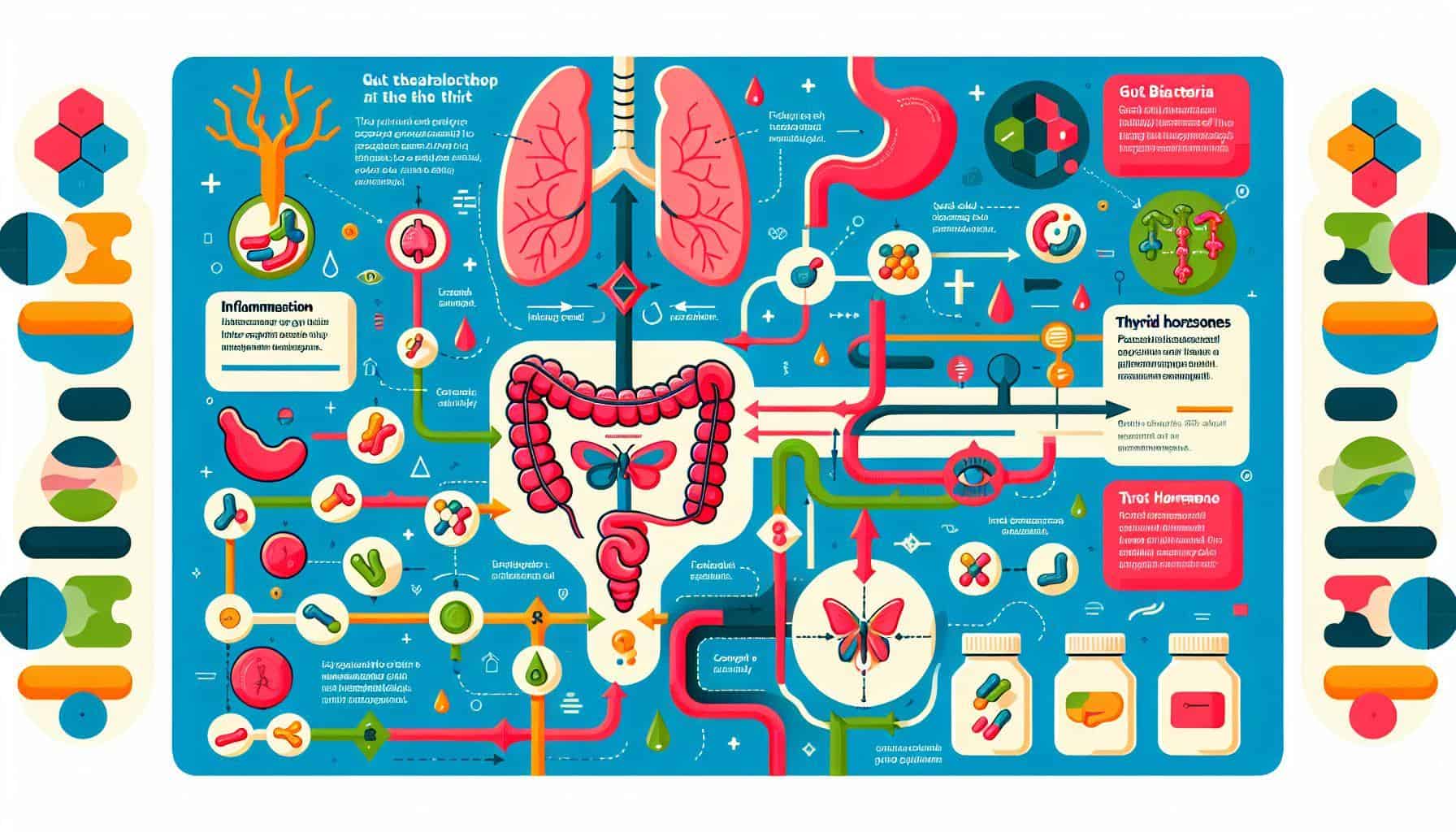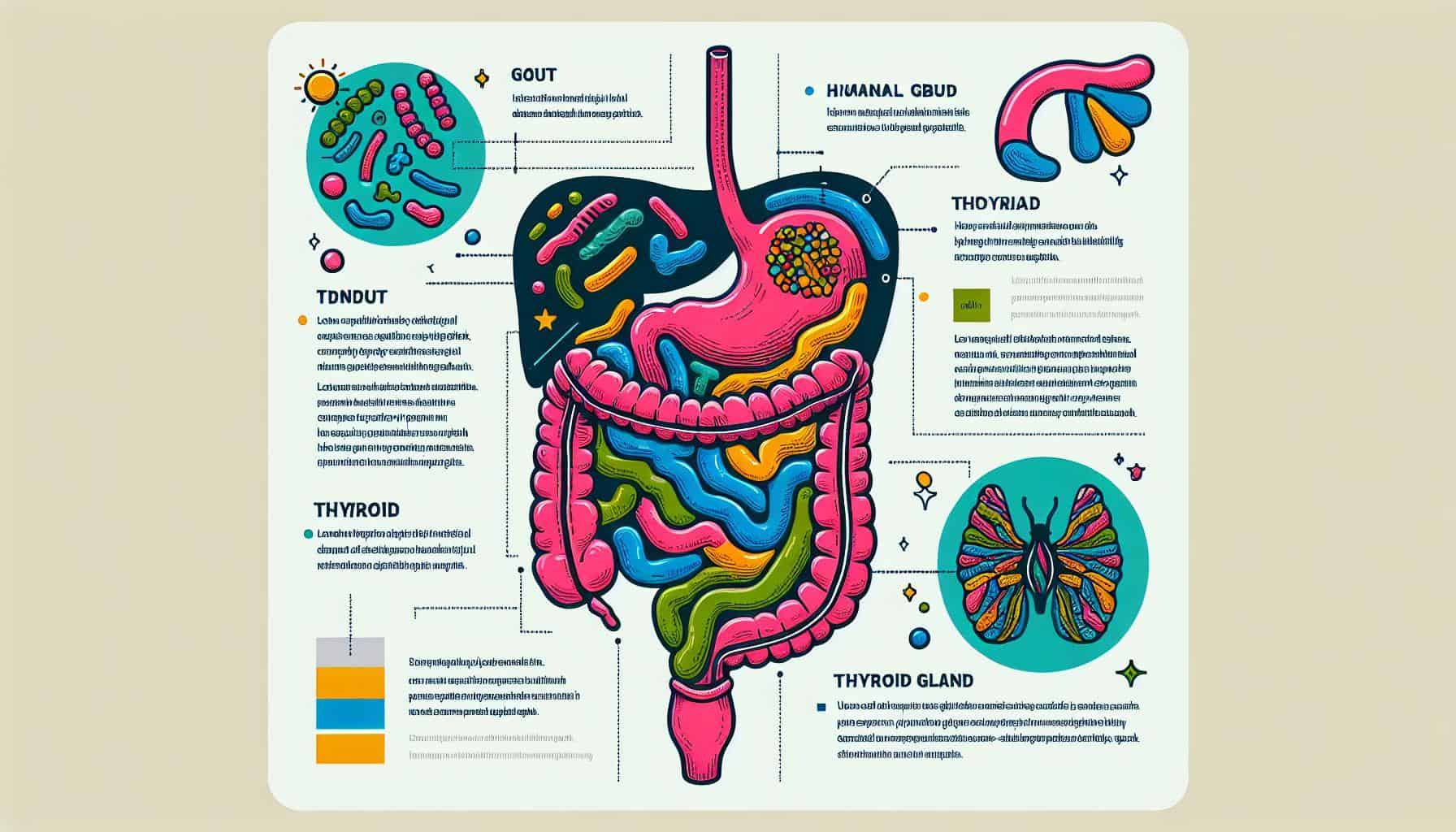Optimize Thyroid Gut Health: Balance Microbiota & Boost T3 Conversion
Ever wondered why, despite a healthy thyroid, you’re still grappling with its symptoms? The culprit could be closer than you think: your gut. An imbalance in your gut bacteria, or dysbiosis, doesn’t just upset your stomach—it can throw your thyroid health off balance, too.
Your gut is a complex ecosystem that’s not only crucial for digestion but also plays a pivotal role in your overall health, including your thyroid function. From nutrient absorption to immune responses and thyroid hormone metabolism, what happens in your gut doesn’t stay in your gut—it reverberates throughout your body.
The Connection Between Thyroid Health and Gut Health
Experiencing thyroid symptoms with normal lab results could mean your gut health is the culprit. Hypothyroidism, traditionally addressed with hormone therapy and viewed as a genetic condition, may actually have roots in the state of your digestive system. Despite often overlooked by specialists focused solely on endocrinology, gut health plays a pivotal role in your body’s thyroid function.
While the gut-thyroid axis might have escaped the spotlight during routine check-ups, it’s essential to understand that gut dysbiosis—a disruption in the balance of gut bacteria—can mirror the symptoms of a sluggish thyroid, even when your thyroid is technically healthy. Moreover, the pattern of focusing on iodine supplementation for thyroid support may not be beneficial as once thought.
Studies have warned against excessive iodine intake, advocating for an upper limit of 100 micrograms daily for non-pregnant individuals and 200 micrograms during pregnancy. Any more, and you risk throwing your intestinal bacteria out of balance. This equilibrium is crucial since these bacteria are responsible for maintaining thyroid hormone reserves and facilitating the activation of T3, the active thyroid hormone.
When gut health is compromised, the production and conversion of thyroid hormones are affected. Addressing thyroid health hence involves a holistic approach that includes nurturing your gut flora. The traditional divide in treating these issues separately often leaves patients with a disjointed understanding of their condition. By recognizing the intricate connection between your gut and thyroid, you can start to unravel the layers that contribute to your symptoms, steering away from fragmented treatment towards a more integrated health strategy.
Understanding Gut Dysbiosis and its Effects on the Thyroid
 Gut dysbiosis, an imbalance in the microbial community within your gut, can wreak havoc not only on your digestive system but also on your thyroid health. A healthy mix of gut bacteria largely influences the performance of various bodily functions, including the immune response and the thyroid’s ability to produce and regulate hormones. A compromised microbiome shifts this delicate balance, potentially leading to thyroid disorders.
Gut dysbiosis, an imbalance in the microbial community within your gut, can wreak havoc not only on your digestive system but also on your thyroid health. A healthy mix of gut bacteria largely influences the performance of various bodily functions, including the immune response and the thyroid’s ability to produce and regulate hormones. A compromised microbiome shifts this delicate balance, potentially leading to thyroid disorders.
The thyroid-gut axis is a term that encapsulates the relationship between your gut health and thyroid function. This connection is crucial as dysbiosis can trigger inflammation, undermining immune tolerance and perpetuating damage to the intestinal lining. Increased intestinal permeability, colloquially known as ‘leaky gut,’ allows antigens to invade the bloodstream, causing systemic inflammation that particularly stresses the thyroid.
Moreover, good gut health is essential for the conversion of thyroid hormones. Dysbiosis can significantly reduce the conversion rates of inactive thyroid hormones to the active form, triiodothyronine (T3). Without proper conversion, you may experience classic symptoms of hypothyroidism—such as fatigue, weight gain, and depression—even if your thyroid tests appear normal.
Here’s an insightful glance at how inflammation and dysbiosis affect thyroid hormones:
Impact | Result |
|---|---|
Inflammation raises cortisol | Decreases active T3 levels, increases inactive T3 |
Gut bacteria imbalance | Alters thyroid hormone levels and TSH production |
Lipopolysaccharides (LPS) from bacteria cell walls | Diminish thyroid hormone activity and promote autoimmunity |
Apart from hormonal conversion and inflammation, gut dysbiosis affects the absorption of key minerals—iodine, selenium, zinc, and iron—which are vital for thyroid health. These minerals play a critical role in the synthesis and activities of thyroid hormones.
Remember, the health of your gut is a reflection of your overall wellness, and maintaining a balanced gut microbiota is essential for your thyroid function. So when you’re exploring ways to support and improve your thyroid health, it’s essential to consider the complex interplay between your gut and thyroid, and the role that diet, lifestyle, and potentially probiotics can play in restoring balance.
The Role of Gut Bacteria in Thyroid Function
Your gut health is more closely tied to your thyroid function than you might realize. The gut microbiota—the vast community of bacteria living in your gastrointestinal tract—has a crucial role in maintaining your thyroid’s health and operational efficiency. But how exactly does this system of microscopic organisms influence one of your body’s key hormone regulators?
Well, for starters, there’s a significant process happening inside your gut that directly affects your thyroid hormones. Specifically, gut bacteria assist in the conversion of inactive thyroid hormone T4 into the active T3 form. It’s a lesser-known fact that approximately 20% of this conversion takes place within your gastrointestinal (GI) tract. The transformation occurs as T4 is converted to T3 sulfate (T3S) and triiodothyroacetic acid (T3AC), and here’s where gut health comes into play.
Hormones | Conversion Location |
|---|---|
T4 to T3S | GI Tract |
T4 to T3AC | GI Tract |
To shift T3S and T3AC into their biologically active state—simply the T3 your body can use—an enzyme known as intestinal sulfatase is necessary. This critical enzyme is courtesy of—you’ve guessed it—your healthy gut bacteria. When dysbiosis, an imbalance between beneficial and harmful bacteria, occurs, the presence of intestinal sulfatase drops, hindering this important conversion process. This is one pivotal reason you might experience thyroid symptoms despite having normal thyroid lab results.
On top of hormone conversion, the microbiota’s influence extends to essential mineral uptake. Nutrients such as iodine, selenium, zinc, and iron are integral to solid thyroid function, and a balanced gut microbiota is key to the efficient absorption of these minerals.
By now, you’re likely thinking about the state of your own gut health. If you’re dealing with symptoms that seem to signal a thyroid issue, yet your tests are within normal ranges, it’s time to consider the role your gut health plays. Taking steps toward ensuring a healthy gut—ranging from diet to stress management—might just be what your thyroid needs to function at its best.
How Nutrient Absorption in the Gut Affects Thyroid Health
Understanding the gut’s role in your body’s nutrient uptake is key to recognizing its impact on thyroid health. The gut wall, when healthy, acts as a selective barrier that absorbs essential nutrients while keeping harmful substances out. A compromised gut barrier, also known as ‘leaky gut’, can disrupt this delicate balance.
Particular nutrients that are crucial for thyroid function include selenium, iodine, and zinc. These are the building blocks your thyroid gland needs to produce and activate thyroid hormones. But when you have leaky gut, your intestine’s impaired ability to absorb these nutrients may lead to insufficient levels for optimal thyroid function.
Here’s what you need to know about each nutrient:
- Selenium helps convert T4 into the more active T3 hormone.
- Iodine is a foundational component of thyroid hormones.
- Zinc is necessary for the synthesis of thyroid hormone and can affect metabolism if levels are suboptimal.
Nutrient | Role in Thyroid Function |
|---|---|
Selenium | Conversion of T4 to T3 |
Iodine | Synthesis of Thyroid Hormone |
Zinc | Aid in Thyroid Hormone Production and Metabolism |
How can you ensure your gut is equipped to absorb these nutrients effectively? Focus on a diet rich in whole, unprocessed foods. By including a variety of fruits, vegetables, and fermented foods, you give your gut the nutrients it thrives on to maintain a healthy mucosal lining. This, in turn, can help prevent leaky gut and support a healthy thyroid.
The proteins that may “leak” from the gut due to weakened barriers share structural similarities with thyroid tissue. When these escape into the bloodstream, the body may mistakenly direct an autoimmune response towards the thyroid, mistaking its own tissue for foreign proteins. Hence, maintaining a strong gut lining is crucial to prevent this form of autoimmunity known as Hashimoto’s thyroiditis.
Prioritize gut health by incorporating stress-reduction techniques; chronic stress can put your digestion on the back burner. Simple practices like deep breathing exercises and meditation can help manage stress, thereby supporting both your gut and thyroid health.
Impact of Gut Health on Immune Responses and Thyroid Function
 Your gut’s health plays a pivotal role in the functionality of your immune system, particularly within the gut-associated lymphoid tissue (GALT). GALT is crucial for maintaining immune balance. It’s where 70% of your immune system resides, storing and deploying immune cells like T and B lymphocytes to combat attacks, including autoimmune conditions such as Hashimoto’s.
Your gut’s health plays a pivotal role in the functionality of your immune system, particularly within the gut-associated lymphoid tissue (GALT). GALT is crucial for maintaining immune balance. It’s where 70% of your immune system resides, storing and deploying immune cells like T and B lymphocytes to combat attacks, including autoimmune conditions such as Hashimoto’s.
When your gut is compromised, as in the case of leaky gut, undesired substances can seep through. This can prompt your immune system to react. This heightened immune response can be detrimental if it starts targeting your own cells, as seen in autoimmunity, which may impact thyroid health. Remember, the immune system’s misfire against the thyroid gland can hamper thyroid function and even lead to chronic thyroid conditions.
At the same time, your gut bacteria are heavily involved in nutrient absorption and thyroid hormone metabolism. A state of dysbiosis, an imbalance in gut microbiota, can lead to inflammation, contributing to or exacerbating disorders of the thyroid.
- Maintain a balanced diet: To support your gut microbiome and, by extension, your thyroid, focus on whole, unprocessed foods such as fruits, vegetables, fibers, and fermented foods. These foods supply essential nutrients and help maintain a healthy microbial balance.
- Reduce stress: Because chronic stress can wreak havoc on your gut, leading to impaired digestion and gut health, it’s vital to engage in stress-reduction practices. Meditation, deep breathing, or other calming activities can be effective in maintaining gut integrity.
Moreover, thyroid hormone conversion is a process significantly influenced by gut health. Beneficial gut microbes produce an enzyme called intestinal sulfatase, which is necessary for converting the inactive thyroid hormone T4 into its active form, T3. A healthy gut environment ensures proper hormonal balance, highlighting the gut-thyroid connection.
By fostering a stable and healthy gut microbiota, you’re actively supporting your immune system’s proper functioning and, in turn, thyroid health. A well-maintained gut microbiota is not just about digestion—it’s a cornerstone of overall wellness, impacting everything from your immune responses to the hormonal harmony that governs your body’s thyroid function.
Conclusion
Recognizing the intricate link between your gut and thyroid health is a game-changer for your well-being. By nurturing your gut microbiota and keeping your digestive system in check you’re not only boosting your immune system but also ensuring your thyroid functions optimally. Embrace a lifestyle that includes a balanced diet and stress management to keep these systems in harmony. Remember the power lies in your hands to foster a healthier you by taking care of your gut which in turn will take care of your thyroid. Your body’s symphony of complex interactions depends on this balance so make gut health a priority.
Frequently Asked Questions
Can thyroid issues affect gut health?
Yes, thyroid imbalances can significantly impact gut health, leading to symptoms like bloating, constipation, and diarrhea. The thyroid regulates metabolism, which includes digestive processes.
How does gut health influence thyroid function?
A healthy gut is key to proper immune function and thyroid hormone metabolism. Gut dysbiosis can trigger immune responses that may affect the thyroid and impair hormone conversion from T4 to T3.
What dietary changes can support thyroid and gut health?
For optimal thyroid and gut health, maintaining a balanced diet rich in fiber, probiotics, and essential nutrients is recommended. Minimize processed foods and manage stress levels.
Can gut bacteria affect thyroid hormones?
Yes, gut bacteria play a crucial role in nutrient absorption and thyroid hormone metabolism, thus influencing overall thyroid function.
What is the connection between leaky gut and the thyroid?
Leaky gut allows undesired substances to enter the bloodstream, which can activate an immune response. This response might mistakenly target the thyroid gland, leading to thyroid issues.

